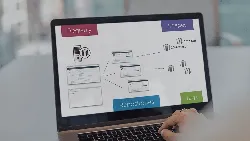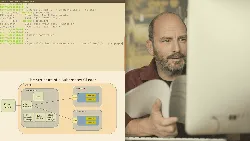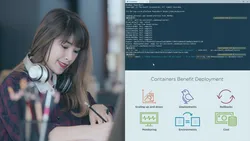
Implementing a Self-hosted Docker Registry 
This course will provide an overview of the different scenarios for using Docker Hub and how to configure a self-hosted registry. Participants will gain the knowledge and skills necessary to take total control of their registry. ▼
ADVERTISEMENT
Course Feature
![]() Cost:
Cost:
Free Trial
![]() Provider:
Provider:
Pluralsight
![]() Certificate:
Certificate:
Paid Certification
![]() Language:
Language:
English
![]() Start Date:
Start Date:
On-Demand
Course Overview
❗The content presented here is sourced directly from Pluralsight platform. For comprehensive course details, including enrollment information, simply click on the 'Go to class' link on our website.
Updated in [February 21st, 2023]
(Please note the following content is from the official provider.)
This course will cover different scenarios using Docker Hub to take total control of a registry and explore settings necessary to deploy a self-hosted registry.
What would Docker be without Docker Hub? If it were not for images, you would never have heard of Docker, and that's because simplifying image distribution is what made Docker exponentially useful. Initially the images on Docker Hub suffice, but at some point, as you begin to build your own images, you'll outgrow storing them on Docker Hub for a variety of reasons. In this course, Implementing a Self-hosted Docker Registry, we will dissect deploying your own registry in the following scenarios. First, you will learn to take total control of a registry, perhaps as a matter of compliance, and learn to distribute sensitive images privately. Next, you will see how to co-locate a registry for performance reasons, to save bandwidth, or to mirror Docker Hub images to a local registry cache. Then, you will explore the internal workings of a registry and gain flexibility in securing your registry. Finally, you will be able to standardize application packaging and distribution within your organization using Docker images, to reap the same benefits that Docker Hub brought to open-source public applications. By the end of this course, you'll be well prepared to deploy your own self-hosted registry.
(Please note that we obtained the following content based on information that users may want to know, such as skills, applicable scenarios, future development, etc., combined with AI tools, and have been manually reviewed)
What skills and knowledge will you acquire during this course?
By taking this course, learners will acquire a comprehensive understanding of Docker Hub and the different scenarios of deploying a self-hosted registry. They will gain knowledge of how to take total control of a registry, co-locate a registry for performance reasons, explore the internal workings of a registry, and gain flexibility in securing their registry. Additionally, learners will learn how to standardize application packaging and distribution within their organization using Docker images. Furthermore, they will develop the skills necessary to deploy their own self-hosted registry.
How does this course contribute to professional growth?
This course contributes to professional growth by providing learners with the knowledge and skills necessary to deploy a self-hosted Docker registry. Learners will gain a comprehensive understanding of Docker Hub and the different scenarios of deploying a self-hosted registry. They will also learn how to take total control of a registry, co-locate a registry for performance reasons, explore the internal workings of a registry, and gain flexibility in securing their registry. Additionally, learners will be able to standardize application packaging and distribution within their organization using Docker images. As a result, learners will be well-prepared to deploy their own self-hosted registry, which will contribute to their professional growth.
Is this course suitable for preparing further education?
This course is suitable for preparing further education, as it provides learners with a comprehensive understanding of Docker Hub and the different scenarios of deploying a self-hosted registry. Learners will gain the knowledge and skills necessary to take total control of a registry, co-locate a registry for performance reasons, explore the internal workings of a registry, and gain flexibility in securing their registry. Additionally, learners will be able to standardize application packaging and distribution within their organization using Docker images.
Course Provider

Provider Pluralsight's Stats at AZClass
Pluralsight ranked 16th on the Best Medium Workplaces List.
Pluralsight ranked 20th on the Forbes Cloud 100 list of the top 100 private cloud companies in the world.
Pluralsight Ranked on the Best Workplaces for Women List for the second consecutive year.
AZ Class hope that this free trial Pluralsight course can help your Docker skills no matter in career or in further education. Even if you are only slightly interested, you can take Implementing a Self-hosted Docker Registry course with confidence!
Discussion and Reviews
0.0 (Based on 0 reviews)
Explore Similar Online Courses

Getting Productive with Chef Cookbooks

Linux System Optimization

Python for Informatics: Exploring Information

Social Network Analysis

Introduction to Systematic Review and Meta-Analysis

The Analytics Edge

DCO042 - Python For Informatics

Causal Diagrams: Draw Your Assumptions Before Your Conclusions

Whole genome sequencing of bacterial genomes - tools and applications

Managing Docker on Linux Servers

Fundamentals of Docker and Kubernetes for NET Developers

WSL 2 Docker Kali Linux and Windows Terminal - get started
 Related Categories
Related Categories
 Popular Providers
Popular Providers
Quiz
 Submitted Sucessfully
Submitted Sucessfully
1. What is the main purpose of this course?
2. What are the benefits of using Docker Hub?
3. What are the scenarios covered in this course?
4. What will you be able to do by the end of this course?


Start your review of Implementing a Self-hosted Docker Registry